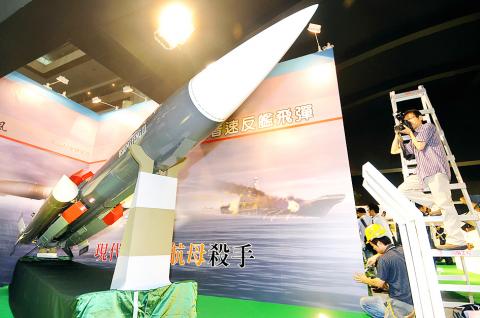Additional deployment of the locally developed Hsiung Feng III (HF-3) “Brave Wind” surface-to-surface supersonic anti-ship missile on LaFayette-class Kang Ding (康定級)and Chi Yang Knox-class(濟陽級) frigates within the year is being considered in the face of China’s increasing buildup of its naval capabilities, the Ministry of National Defense said yesterday.
The HF-3 supersonic surface-to-surface missile had been under research and development by the Chungshan Institute of Science and Technology (中山科學研究院) for nearly two decades, and was made public in a military exercise in 2007.
While the ministry has not released any information on the capabilities of the HF-3 missile, military magazines surmise that the missile may reach speeds of between Mach 2.5 and Mach 3 at a range of between 150km and 200km.

Photo: Taipei Times
The magazines also report that the missile might be equipped with an active radar homing system and would be guided by the navy’s communication and observation systems in a wartime situation, and, as such, the missile could be considered a “fire-and-forget” type of missile.
According to an anonymous source who participated in the Hsiung Feng project, the HF-3 is more precise than either of its predecessors — the Hsiung Feng I and Hsiung Feng II — and is also superior in terms of its ability to penetrate the defensive capabilities of enemy ships.
Commenting on the tight lid the military has kept on the missile’s capabilities and specifications, the source said the difficulty in making supersonic missiles lay not in the principle, but in the missiles’ exterior form and calibrations.
Nations all over the world have classified such information, and Taiwan is no different, the source said.
The source added that the success of the Chungshan Institute in completing the missile was an important milestone for the nation.
The ministry said that the missile has already been deployed on the Cheng Kung-class(成功級) frigate, the navy’s Perry-class frigates, the locally researched and made Ching Chiang class(錦江級), and the Kuang Hua VI-class fast attack missile craft (光華六號).
The ministry is also considering deploying the HF-3 missiles on the two Oliver Hazard Perry-class frigates that the ministry intends to purchase from the US next year, ministry officials said.
Meanwhile, the ministry has professed concern that China also appears interested in researching supersonic surface-to-surface missiles, adding that the success of such a venture was extremely important to the military balance in the Taiwan Strait.

DAREDEVIL: Honnold said it had always been a dream of his to climb Taipei 101, while a Netflix producer said the skyscraper was ‘a real icon of this country’ US climber Alex Honnold yesterday took on Taiwan’s tallest building, becoming the first person to scale Taipei 101 without a rope, harness or safety net. Hundreds of spectators gathered at the base of the 101-story skyscraper to watch Honnold, 40, embark on his daredevil feat, which was also broadcast live on Netflix. Dressed in a red T-shirt and yellow custom-made climbing shoes, Honnold swiftly moved up the southeast face of the glass and steel building. At one point, he stepped onto a platform midway up to wave down at fans and onlookers who were taking photos. People watching from inside

A Vietnamese migrant worker yesterday won NT$12 million (US$379,627) on a Lunar New Year scratch card in Kaohsiung as part of Taiwan Lottery Co’s (台灣彩券) “NT$12 Million Grand Fortune” (1200萬大吉利) game. The man was the first top-prize winner of the new game launched on Jan. 6 to mark the Lunar New Year. Three Vietnamese migrant workers visited a Taiwan Lottery shop on Xinyue Street in Kaohsiung’s Gangshan District (崗山), a store representative said. The player bought multiple tickets and, after winning nothing, held the final lottery ticket in one hand and rubbed the store’s statue of the Maitreya Buddha’s belly with the other,

‘NATO-PLUS’: ‘Our strategic partners in the Indo-Pacific are facing increasing aggression by the Chinese Communist Party,’ US Representative Rob Wittman said The US House of Representatives on Monday released its version of the Consolidated Appropriations Act, which includes US$1.15 billion to support security cooperation with Taiwan. The omnibus act, covering US$1.2 trillion of spending, allocates US$1 billion for the Taiwan Security Cooperation Initiative, as well as US$150 million for the replacement of defense articles and reimbursement of defense services provided to Taiwan. The fund allocations were based on the US National Defense Authorization Act for fiscal 2026 that was passed by the US Congress last month and authorized up to US$1 billion to the US Defense Security Cooperation Agency in support of the

‘COMMITTED TO DETERRENCE’: Washington would stand by its allies, but it can only help as much as countries help themselves, Raymond Greene said The US is committed to deterrence in the first island chain, but it should not bear the burden alone, as “freedom is not free,” American Institute in Taiwan Director Raymond Greene said in a speech at the Institute for National Defense and Security Research’s “Strengthening Resilience: Defense as the Engine of Development” seminar in Taipei yesterday. In the speech, titled “Investing Together and a Secure and Prosperous Future,” Greene highlighted the contributions of US President Donald Trump’s administration to Taiwan’s defense efforts, including the establishment of supply chains for drones and autonomous systems, offers of security assistance and the expansion of